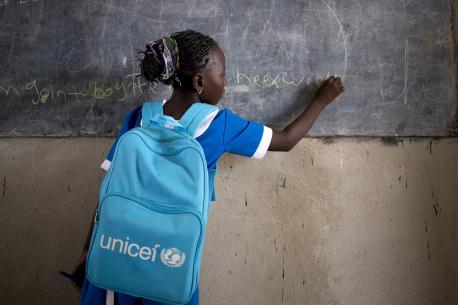
Why UNICEF USA Engages in Advocacy: The READ Act
Advocacy efforts are key to prompting legislative change that improves lives globally
At UNICEF USA, we advocate for – and ask you to advocate for – federal legislation impacting the lives and futures of children in lower -income countries around the world. We look for legislation that supports UNICEF’s mission, and improves the effectiveness of U.S. Government foreign assistance programs. As Americans, we believe that helping children around the world speaks to our deep humanitarian values; and we also know that helping children elsewhere creates a stronger, safer, more prosperous world that helps us here.
One such example is the Reinforcing Education Accountability in Development (READ) Act. This legislation required a new U.S. Government structure and strategy to improve its education programs, to improve educational outcomes for children living in poorer nations.
For UNICEF, education from early childhood through adolescence is central to child development and protection; it acts as a platform for children to achieve better health outcomes and improve their economic opportunity.
Members of Congress argued that the READ Act helps improve economic and security outcomes for the United States. As Rep. Nita Lowey (the bill’s lead sponsor) said, “Education is the fundamental tool that empowers girls and boys to increase their economic potential, improve their health outcomes, address cultural biases, participate in their communities, and provide for their families… prioritizing children’s access to education around the world strengthens our national security and global leadership.”
Thanks to support from our advocates, the READ Act finally passed Congress, and became law in September 2017.
UNICEF USA’s engagement did not end there! Once enacted, the Department of State and the United States Agency for International Development (USAID) were tasked with building the strategy required by the legislation. This five-year guiding document orients and coordinates the work of ten government departments and agencies. The strategy is a great achievement, as it is the first time there has been an integrated government-level plan for improving basic education around the world. UNICEF USA participated in this process, sharing UNICEF perspectives on early childhood development and on the importance of education as a lifesaving humanitarian response for children impacted by crisis and conflict. These perspectives are reflected in the new U.S. Government Strategy on International Basic Education.
The READ Act is a great example of UNICEF USA’s legislative advocacy priorities: backing proposals that support UNICEF’s mission, assisting young people across the globe, and reflecting the values of the American people.


